In 2012, I read 27 books. Here they are in order from least to most inspiration, pleasure, ideas and word-love I derived from them. This is the bottom of the list, top picks to come!
(19) How Fiction Works (2008) – James Wood
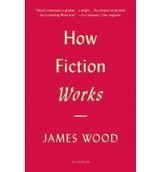 Coherent, snappy, reader-friendly literary criticism: aaah, sweet relief. James Wood, I will always love you for brilliantly taking down Paul Auster and Michel Houellebecq as overrated in the pages of The New Yorker, no less. Though minus point for how little of an impact this treatise ultimately made on me. (I realize this could also be because the internet has rotted my brain.) The only thing I can recall several months after reading it is that it convinced me to read more Saul Bellow. I guess that could be counted as a success.
Coherent, snappy, reader-friendly literary criticism: aaah, sweet relief. James Wood, I will always love you for brilliantly taking down Paul Auster and Michel Houellebecq as overrated in the pages of The New Yorker, no less. Though minus point for how little of an impact this treatise ultimately made on me. (I realize this could also be because the internet has rotted my brain.) The only thing I can recall several months after reading it is that it convinced me to read more Saul Bellow. I guess that could be counted as a success.
(20) Bright Lights, Big City (1984) – Jay McInerney
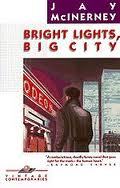
Fluffier than I expected, though some parts definitely made me laugh. Reminded me ofJonathan Ames (The Extra Man), except that I enjoyed Ames much more: more meat, more heft, more risks, more heart. Not convinced the second-person narrative did anything that first-person narrative can’t do.
(21) Is Everyone Hanging Out Without Me? (And Other Concerns) (2011) – Mindy 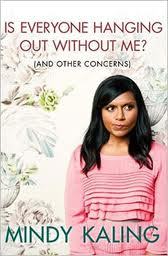 Kaling
Kaling
Some funny stuff, though not recommended if you aren’t prepared to deal with her self-obsessed persona. I would skip the accounts of her childhood (not so interesting & not good writing), but enjoyed her take on show business, early years in NYC, etc.
(22) Reading Lolita in Tehran (2003) – Azar Nafisi
My favourite parts were when Nafisi was writing as literature professor – intriguing 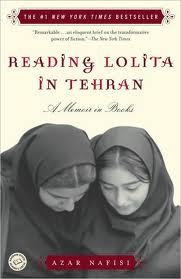 interpretations of The Great Gatsby, Daisy Miller & Lolita, and their bearing on her and her students’ lives in Iran. I also learned about Iranian history, a fascinating, nightmarish personal account, the upheaval that has occurred in the past 40 years. The style was a bit formulaic sometimes (as in “I can feel the snow of Tehran as I write, I can see my students’ faces as I type these words”) & I started to get all of the characters mixed up, felt like they weren’t drawn distinctly enough, so I wasn’t emotionally drawn in.
interpretations of The Great Gatsby, Daisy Miller & Lolita, and their bearing on her and her students’ lives in Iran. I also learned about Iranian history, a fascinating, nightmarish personal account, the upheaval that has occurred in the past 40 years. The style was a bit formulaic sometimes (as in “I can feel the snow of Tehran as I write, I can see my students’ faces as I type these words”) & I started to get all of the characters mixed up, felt like they weren’t drawn distinctly enough, so I wasn’t emotionally drawn in.
(23) In a Perfect World (2009) – Laura Kasischke
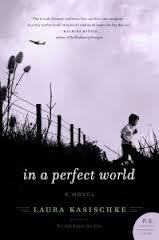 Speculative fiction about a plague, but told from an oblique perspective – that of a slightly depressed, newly married flight attendant forced into mothering her evil stepchildren in a midwest backwater. Wonderful creepy details about how American society deals with the plague (obsessive reporting on celebrity deaths, white helium balloons are anonymously released in memory of victims). Also a dark fairytale quality to it, atmospheric.
Speculative fiction about a plague, but told from an oblique perspective – that of a slightly depressed, newly married flight attendant forced into mothering her evil stepchildren in a midwest backwater. Wonderful creepy details about how American society deals with the plague (obsessive reporting on celebrity deaths, white helium balloons are anonymously released in memory of victims). Also a dark fairytale quality to it, atmospheric.
However, the heroine’s passivity drove me crazy. There are at least five scenes in which someone says or does something awful to her & she’s too stupefied to react… Ultimately it feels like a problem with the mechanics of the book rather than an active choice made by the author.
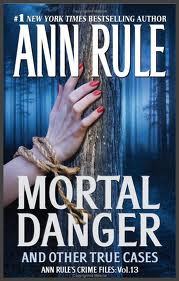 (24) Mortal Danger (2008) – Anne Rule
(24) Mortal Danger (2008) – Anne Rule
Trashy true crime book, provides all the dirty details of real-life murder cases. (I’m including ALL of the books I read in this list!) The first case is actually a prettyinteresting account of how a relationship can become abusive over time & a woman who never imagined herself as “one of those women” finds herself trapped.
(25) The English Patient (1992) – Michael Ondaatje
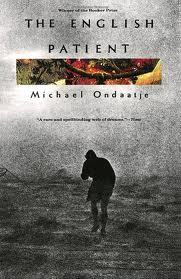
This was a bit force-fed (force-read) for me. The only book I had to read on a long plane ride to the Middle East. I felt a bit like Elaine in that one Seinfeld episode. Many lyrical, lovely quotable passages, Ondaatje is clearly a poet, but on the whole I resisted entering this world because it felt so contrived, precious. (For example, the author kept mentioning the characters were in a collapsing Italian villa, through various romantic iterations; proof of passion is a woman stabbing a man with a fork, cracking a plate on his head. But in a way, it’s supposed to make you feel there’s real passion, real magic you don’t have access to.)
(26) Henry and June (1986) – Anaïs Nin
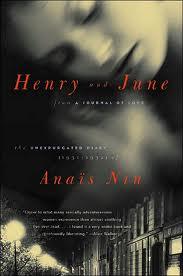 Completely disappointing and actually a little boring after reading Anaïs Nin’s rich, witty, philosophical & idea-packed diaries. This book contains only extractions from her diary that deal with her affair with Henry Miller. Consequently, it’s repetitive and a one-sided vision of a deep-thinking woman- makes her seem singularly obsessed with the affair & its sexual aspects, when there was so much else going on, including within their affair (talks about writing, aesthetics, etc.). If you’re interested in it for the sexy bits, go straight to her erotica (Delta of Venus & Little Birds).
Completely disappointing and actually a little boring after reading Anaïs Nin’s rich, witty, philosophical & idea-packed diaries. This book contains only extractions from her diary that deal with her affair with Henry Miller. Consequently, it’s repetitive and a one-sided vision of a deep-thinking woman- makes her seem singularly obsessed with the affair & its sexual aspects, when there was so much else going on, including within their affair (talks about writing, aesthetics, etc.). If you’re interested in it for the sexy bits, go straight to her erotica (Delta of Venus & Little Birds).
(27) Anais Nin: A Biography (1995) – Deirdre Bair
Read this after much hesitation, but my 2012 obsession with Anais Nin eventually forced my hand. I didn’t trust Bair as a biographer after reading her book on Simone de Beauvoir. Although she writes that she has thought a great deal about remaining  impartial as a biographer there are loads of value judgments in both biographies. It’s not that I needed her to like Nin. It’s that she writes with an active distaste for her subject. No further evidence is needed than her chapter dealing with Nin’s illness and death. While she sums up years-long relationships, books Nin wrote, and other important events in a a paragraph or so, she spends several pages on Nin’s cancer, beginning with the sentence, “The cancer started in the vagina” and details her extensive, years-long suffering. This to me was a passive-aggressive way to mete out justice for Nin’s very active and complicate sex life. No thoughtful assessment of Nin’s complicated relationship with the women’s liberation movement, no real assessment or even description Nin’s life work, least of all the diaries (only details about how she screwed over her loyal publisher for their publication & conspired to get them published by any means possible). No thoughts about what it meant to be a woman writer in her time or even the boldness with which she lived out her sexuality as a woman in a repressive time.
impartial as a biographer there are loads of value judgments in both biographies. It’s not that I needed her to like Nin. It’s that she writes with an active distaste for her subject. No further evidence is needed than her chapter dealing with Nin’s illness and death. While she sums up years-long relationships, books Nin wrote, and other important events in a a paragraph or so, she spends several pages on Nin’s cancer, beginning with the sentence, “The cancer started in the vagina” and details her extensive, years-long suffering. This to me was a passive-aggressive way to mete out justice for Nin’s very active and complicate sex life. No thoughtful assessment of Nin’s complicated relationship with the women’s liberation movement, no real assessment or even description Nin’s life work, least of all the diaries (only details about how she screwed over her loyal publisher for their publication & conspired to get them published by any means possible). No thoughts about what it meant to be a woman writer in her time or even the boldness with which she lived out her sexuality as a woman in a repressive time.
Blargh. I hated it. Only useful to gain some details about who some of the people in the diaries are, in particular her husband & their unusual lifelong relationship (completely omitted from the published diaries).
Books abandoned in 2012:
Time and Again (1970) – Jack Finney
I’ve had several people tell me this gives a vivid account of New York City in the early 20th century, but the writing style was so flat! It’s supposed to be light reading, too… Second time I’ve tried to read this, can’t say I didn’t try.
Murphy – Samuel Beckett
Who brings an experimental depressing Beckett novel to the beach? Not sure when the right time to read this would be, but beachside in August is not it…
Incest – Anais Nin
The second “unexpergated” volume of her diaries, after Henry & June, published by her husband after she died. Again, disappointing after reading the versions she edited & published in her time. Only the personal life is here, so she comes off as rambling, obsessive, shallow (whereas the 1960s diaries reveal a rich inner life). Couldn’t finish it.
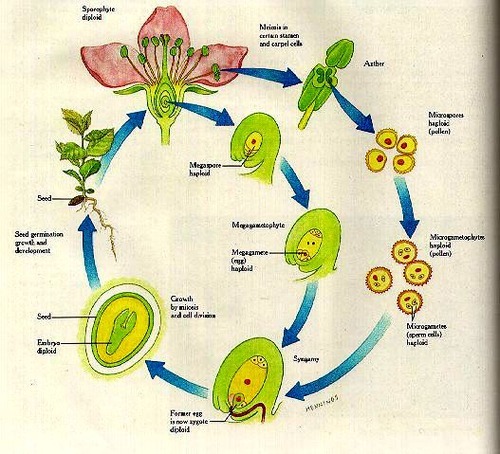

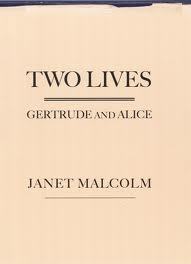 [Origin: St. Mark’s Bookshop remaindered pile, originally $25, purchased for $7. 2007, 224 pages, non-fiction]
[Origin: St. Mark’s Bookshop remaindered pile, originally $25, purchased for $7. 2007, 224 pages, non-fiction]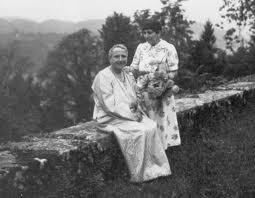 their Jewishness, in both their life & their writing. (They were close friends with a Nazi collaborator, who was the one who helped them remain in occupied France, did not ever write directly about the atrocities of the Holocaust, although there was no way they could not have known, at a certain point.)
their Jewishness, in both their life & their writing. (They were close friends with a Nazi collaborator, who was the one who helped them remain in occupied France, did not ever write directly about the atrocities of the Holocaust, although there was no way they could not have known, at a certain point.)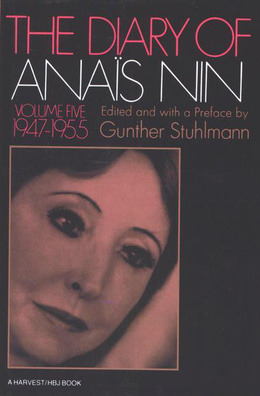 The Diary of Anaïs Nin, Volume 2, 1934-1939 (1967)
The Diary of Anaïs Nin, Volume 2, 1934-1939 (1967)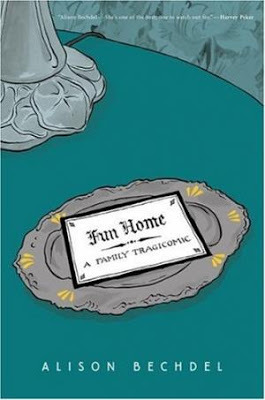 image and text is layered, each panel precise and necessary. I was amazed at how she was able to transmit the confusion and complexity of being a child and adolescent: how the historical time, family history and your personal development (body & mind) all mixes together, while figuring out questions of sexuality, gender and selfhood. The specificity of a time and the great looming role your parents play in it. Literature weaving through it as it did through her relationship with her father. Absorbing, moving, funny.
image and text is layered, each panel precise and necessary. I was amazed at how she was able to transmit the confusion and complexity of being a child and adolescent: how the historical time, family history and your personal development (body & mind) all mixes together, while figuring out questions of sexuality, gender and selfhood. The specificity of a time and the great looming role your parents play in it. Literature weaving through it as it did through her relationship with her father. Absorbing, moving, funny.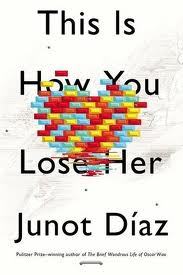 I found this collection to be a bit uneven compared with Drown. The very last story, for example, just sounds like Díaz sitting down & telling you about how he fucked up his love life over a couple of beers, which is entertaining enough, but lacks his magic touch. This book is near the top of my list because of the story “Invierno”, which was so gripping, vivid, & true. It got inside me unlike any other short story I’ve read recently.
I found this collection to be a bit uneven compared with Drown. The very last story, for example, just sounds like Díaz sitting down & telling you about how he fucked up his love life over a couple of beers, which is entertaining enough, but lacks his magic touch. This book is near the top of my list because of the story “Invierno”, which was so gripping, vivid, & true. It got inside me unlike any other short story I’ve read recently.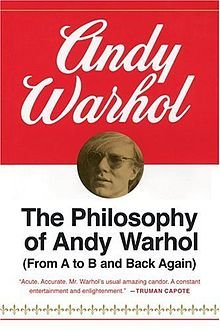
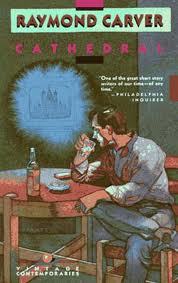 (6) Cathedral (1983) – Raymond Carver
(6) Cathedral (1983) – Raymond Carver 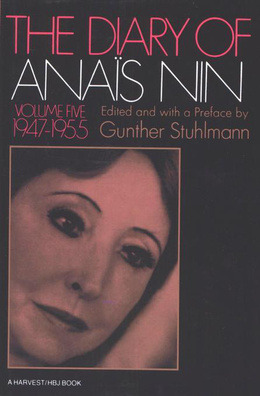
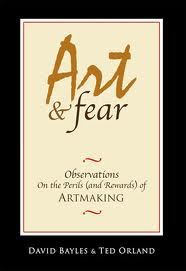 (9) Art and Fear: Observations on the Perils (and Rewards of) Artmaking (1993) – David Bayles and Ted Orland
(9) Art and Fear: Observations on the Perils (and Rewards of) Artmaking (1993) – David Bayles and Ted Orland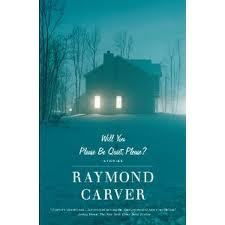
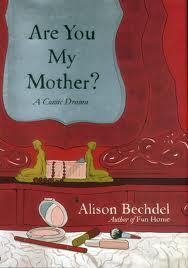 mother and coming to terms with her feelings about her mother in psychotherapy. I could see how its “meta-book” quality (she talks about the process of writing the book in the book) and its focus on her therapy (many pages are panels of conversations with her therapists) would not appeal to everyone, but I felt very open to it & interested in it. She touches on a lot of my own interests – the theories of Dinald Winicott, the life of Virginia Woolf, the psychoanalytic process. Bechdel’s persona, a curious, creative, insecure, unrelentingly honest artist and memoirist is also highly sympathetic.
mother and coming to terms with her feelings about her mother in psychotherapy. I could see how its “meta-book” quality (she talks about the process of writing the book in the book) and its focus on her therapy (many pages are panels of conversations with her therapists) would not appeal to everyone, but I felt very open to it & interested in it. She touches on a lot of my own interests – the theories of Dinald Winicott, the life of Virginia Woolf, the psychoanalytic process. Bechdel’s persona, a curious, creative, insecure, unrelentingly honest artist and memoirist is also highly sympathetic.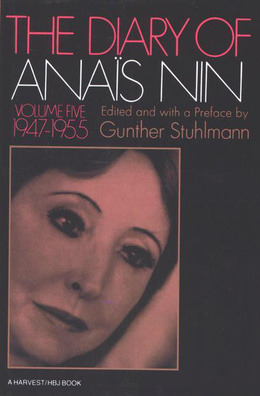

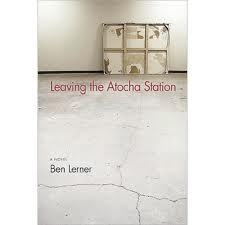 Young American poet in Madrid. Some say this is thinly disguised autobiography – I found myself actually not being that curious either way, which is not always the case. I really liked the internal quality of the novel, the absolute subjectivity. You get the feeling that the people the narrator interacts with actually like him better and think he’s smarter, more interesting & socially adjusted than he gives himself credit for (doesn’t help that he’s high & paranoid most of the time). I also loved the way he described the fog of living in a country where you halfway speak the language, how you have multiple interpretations for what someone could be saying to you, and how all of those versions might be wrong. My only quibble was with the ending, it’s all tied up into a neat bow, not sure what we as readers are intended to be left with. (I passed it along to a friend, not a keeper on the shelf, but worth passing along.)
Young American poet in Madrid. Some say this is thinly disguised autobiography – I found myself actually not being that curious either way, which is not always the case. I really liked the internal quality of the novel, the absolute subjectivity. You get the feeling that the people the narrator interacts with actually like him better and think he’s smarter, more interesting & socially adjusted than he gives himself credit for (doesn’t help that he’s high & paranoid most of the time). I also loved the way he described the fog of living in a country where you halfway speak the language, how you have multiple interpretations for what someone could be saying to you, and how all of those versions might be wrong. My only quibble was with the ending, it’s all tied up into a neat bow, not sure what we as readers are intended to be left with. (I passed it along to a friend, not a keeper on the shelf, but worth passing along.)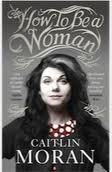 horoughly enjoyable if you disregard her lofty claims for the book. Namely, that it’s a sorely needed feminist treatise on pop culture & the everyday conundrums of femininity (such as what to wear). Especially if Lady Gaga is the absolute height of feminist achievement (as she claims, ugh). There’s in fact extensive writing & thinking on this stuff all over the internet (though maybe not written by someone of her generation).
horoughly enjoyable if you disregard her lofty claims for the book. Namely, that it’s a sorely needed feminist treatise on pop culture & the everyday conundrums of femininity (such as what to wear). Especially if Lady Gaga is the absolute height of feminist achievement (as she claims, ugh). There’s in fact extensive writing & thinking on this stuff all over the internet (though maybe not written by someone of her generation).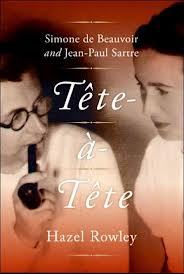 Fascinating account of the lifelong relationship between Simone de Beauvoir & Jean-Paul Sartre, spanning their complicated private lives, literary works and the great wave of the 20th centruy. This was my second read, otherwise would be higher on the list – my first read transformed my perspective for a while.
Fascinating account of the lifelong relationship between Simone de Beauvoir & Jean-Paul Sartre, spanning their complicated private lives, literary works and the great wave of the 20th centruy. This was my second read, otherwise would be higher on the list – my first read transformed my perspective for a while.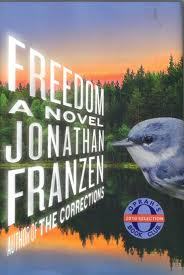 -Absolutely absorbing. He plants information masterfully, weaves the story in a way that keeps you reading (from the first sentence you know there’s a downfall to come). Franzen sticks to his mantra of being a friend to the reader – a feat to create a literary page-turner.
-Absolutely absorbing. He plants information masterfully, weaves the story in a way that keeps you reading (from the first sentence you know there’s a downfall to come). Franzen sticks to his mantra of being a friend to the reader – a feat to create a literary page-turner. Coherent, snappy, reader-friendly literary criticism: aaah, sweet relief. James Wood, I will always love you for brilliantly taking down Paul Auster and Michel Houellebecq as overrated in the pages of The New Yorker, no less. Though minus point for how little of an impact this treatise ultimately made on me. (I realize this could also be because the internet has rotted my brain.) The only thing I can recall several months after reading it is that it convinced me to read more Saul Bellow. I guess that could be counted as a success.
Coherent, snappy, reader-friendly literary criticism: aaah, sweet relief. James Wood, I will always love you for brilliantly taking down Paul Auster and Michel Houellebecq as overrated in the pages of The New Yorker, no less. Though minus point for how little of an impact this treatise ultimately made on me. (I realize this could also be because the internet has rotted my brain.) The only thing I can recall several months after reading it is that it convinced me to read more Saul Bellow. I guess that could be counted as a success.
 Kaling
Kaling interpretations of The Great Gatsby, Daisy Miller & Lolita, and their bearing on her and her students’ lives in Iran. I also learned about Iranian history, a fascinating, nightmarish personal account, the upheaval that has occurred in the past 40 years. The style was a bit formulaic sometimes (as in “I can feel the snow of Tehran as I write, I can see my students’ faces as I type these words”) & I started to get all of the characters mixed up, felt like they weren’t drawn distinctly enough, so I wasn’t emotionally drawn in.
interpretations of The Great Gatsby, Daisy Miller & Lolita, and their bearing on her and her students’ lives in Iran. I also learned about Iranian history, a fascinating, nightmarish personal account, the upheaval that has occurred in the past 40 years. The style was a bit formulaic sometimes (as in “I can feel the snow of Tehran as I write, I can see my students’ faces as I type these words”) & I started to get all of the characters mixed up, felt like they weren’t drawn distinctly enough, so I wasn’t emotionally drawn in. Speculative fiction about a plague, but told from an oblique perspective – that of a slightly depressed, newly married flight attendant forced into mothering her evil stepchildren in a midwest backwater. Wonderful creepy details about how American society deals with the plague (obsessive reporting on celebrity deaths, white helium balloons are anonymously released in memory of victims). Also a dark fairytale quality to it, atmospheric.
Speculative fiction about a plague, but told from an oblique perspective – that of a slightly depressed, newly married flight attendant forced into mothering her evil stepchildren in a midwest backwater. Wonderful creepy details about how American society deals with the plague (obsessive reporting on celebrity deaths, white helium balloons are anonymously released in memory of victims). Also a dark fairytale quality to it, atmospheric.  (24) Mortal Danger (2008) – Anne Rule
(24) Mortal Danger (2008) – Anne Rule
 Completely disappointing and actually a little boring after reading Anaïs Nin’s rich, witty, philosophical & idea-packed diaries. This book contains only extractions from her diary that deal with her affair with Henry Miller. Consequently, it’s repetitive and a one-sided vision of a deep-thinking woman- makes her seem singularly obsessed with the affair & its sexual aspects, when there was so much else going on, including within their affair (talks about writing, aesthetics, etc.). If you’re interested in it for the sexy bits, go straight to her erotica (Delta of Venus & Little Birds).
Completely disappointing and actually a little boring after reading Anaïs Nin’s rich, witty, philosophical & idea-packed diaries. This book contains only extractions from her diary that deal with her affair with Henry Miller. Consequently, it’s repetitive and a one-sided vision of a deep-thinking woman- makes her seem singularly obsessed with the affair & its sexual aspects, when there was so much else going on, including within their affair (talks about writing, aesthetics, etc.). If you’re interested in it for the sexy bits, go straight to her erotica (Delta of Venus & Little Birds). impartial as a biographer there are loads of value judgments in both biographies. It’s not that I needed her to like Nin. It’s that she writes with an active distaste for her subject. No further evidence is needed than her chapter dealing with Nin’s illness and death. While she sums up years-long relationships, books Nin wrote, and other important events in a a paragraph or so, she spends several pages on Nin’s cancer, beginning with the sentence, “The cancer started in the vagina” and details her extensive, years-long suffering. This to me was a passive-aggressive way to mete out justice for Nin’s very active and complicate sex life. No thoughtful assessment of Nin’s complicated relationship with the women’s liberation movement, no real assessment or even description Nin’s life work, least of all the diaries (only details about how she screwed over her loyal publisher for their publication & conspired to get them published by any means possible). No thoughts about what it meant to be a woman writer in her time or even the boldness with which she lived out her sexuality as a woman in a repressive time.
impartial as a biographer there are loads of value judgments in both biographies. It’s not that I needed her to like Nin. It’s that she writes with an active distaste for her subject. No further evidence is needed than her chapter dealing with Nin’s illness and death. While she sums up years-long relationships, books Nin wrote, and other important events in a a paragraph or so, she spends several pages on Nin’s cancer, beginning with the sentence, “The cancer started in the vagina” and details her extensive, years-long suffering. This to me was a passive-aggressive way to mete out justice for Nin’s very active and complicate sex life. No thoughtful assessment of Nin’s complicated relationship with the women’s liberation movement, no real assessment or even description Nin’s life work, least of all the diaries (only details about how she screwed over her loyal publisher for their publication & conspired to get them published by any means possible). No thoughts about what it meant to be a woman writer in her time or even the boldness with which she lived out her sexuality as a woman in a repressive time.